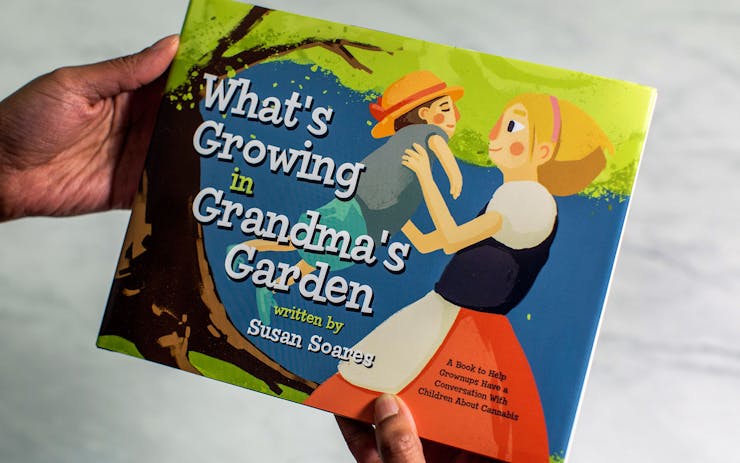Generally speaking, kids and cannabis aren’t a good combo (with medical exceptions). Though we don’t know nearly enough about the endocannabinoid system (ECS), we do know that it is a delicate system that requires balance, and that the brain is developing until one’s mid-twenties. However, there isn’t much being said about what to tell young people in an era where cannabis is suddenly appearing everywhere.
Susan Soares is a longtime cannabis advocate who was faced with a related question on The Woody Show, and she left feeling disappointed with her answer. Some may have shrugged it off, assuming that someone else would be the one to tackle the matter, but Soares instead chose to confront it directly.
It’s easier to hide it than explain it

(Leafly)
She spent a year interviewing adults in regards to talking to their kids about cannabis, and found that less than 5% of parents she interviewed were informing their children about the subject—even if they worked in the industry. “Even if it was painfully obvious, they’re trying to hide it from their kids,” Soares said.
Soares found that less than 5% of parents she interviewed were informing their children about cannabis—even if they worked in the industry.
When adults hide something from children, it suggests that they’re doing something wrong, which feeds the stigma around cannabis—and they’ll become judgmental of it as well. So when the child grows curious, they’re likely to fear that judgement and it breaks down conversation. “When we judge people, they feel shame,” Soares said, “and then they don’t want to talk to us anymore. And that’s not what we want from our children. We want them to talk to us.”
Soares believes that informing young people on cannabis helps keep them safe. “Unless it’s being used for a medical purpose, it would really be better for them if they waited until their brains are fully grown,” she said. “They need to have the information.”
Her grandchildren, of course, are well informed on the matter. “My grandsons say, ‘I can’t have alcohol, or coffee, or cannabis,’ they say it all the time. They’re proud of it,” Soares said. “They get it.”
What’s Growing in Grandma’s Garden?

(Leafly)
Soares decided to tackle this matter by giving adults an aid to talk to their kids about cannabis— something that would be light enough for a child to enjoy, but also talked about the importance of waiting to enjoy this quickly-becoming-legal plant that adults are so excited about.
Soares lives in California, where medical cannabis has been legal for decades, and became recreationally legal in 2018.
So, she set out to write a book—a children’s book, about cannabis. What’s Growing in Grandma’s Garden tells the real-life tale of her grandson getting curious about her “special” locked greenhouse, which is full of cannabis.
“I wrote the book with very few words,” Soares said, “It’s very light, and it’s just meant to inspire conversation.”
The book starts out by describing her garden from the kiddo’s point of view, talking about how most of the plants are for food and medicine (she also grows echinacea, aloe vera, and kratom), and the fun bugs and snacks he gets to encounter along the way.
After introducing the locked greenhouse, the pair gather ingredients for lunch. Grandson picks out sweet potatoes, and grandma gets raw cannabis to put into her fruit smoothie. When he asks her to try a bit of it, she doesn’t let him. (This part is especially important during a time when people are putting CBD into everything—non-intoxicating doesn’t mean it’s not interacting with the delicate and understudied ECS.) She then draws a brain with sidewalk chalk to help explain that his brain is still growing, and that he needs to feed it the right things to ensure he grows up to have a strong and fast brain.
After grandma medicates her sore sidewalk-chalking knees with a non-intoxicating cannabis oil, everyone comes over for their weekly barbecue. While the kids play hide-and-seek, and the other adults sip some wine (“do grown-up things”), grandma finally gets to get her buzz on, hanging downwind with a joint by the greenhouse. Then she packs up lots of fresh vegetables for everyone to take with them, and they’re on their way.
We can talk about “grown-up things”
Soares says it’s important to be frank about why adults enjoy things like cannabis and wine. “Intoxication is an interesting subject. If you notice on the cover of the book, the grandmother is spinning the grandson around. And the reason for that is that kids like to spin around, they like to feel dizzy, to alter their reality—it’s a form of intoxication.” She adds that many people take intoxicating pharmaceuticals every morning, and people rarely, if ever, talk about it.
Soares says that it’s time to stop being so ashamed of enjoying the feeling of intoxication, because it’s natural. “Why do we like roller coaster rides? And it’s not just a human thing. There are animals, birds, and insects that like it, too. Why can’t we just admit that we like it?”
In order for young people to know how to treat an intoxicant, they need to have someone that they can ask honest questions to, just like they do with topics like sex or swearing. She says her book can be used to facilitate a time to talk about other adults-only issues. “It’s an opportunity to talk about all the grown-up things.”
So, if you have children, what do they know about cannabis? If you’re not the one informing them, then they will probably choose between inaccurate, but still popular, fear-based education (which is often disregarded), or they’ll listen to the industry, which is very busy telling adults it’s healthy. And while that’s actually accurate for many well-balanced adults, it’s probably not the message you want them to hear.
By the way—if Soares’ book sounds like it might be the right tool for you, you can purchase it here.





